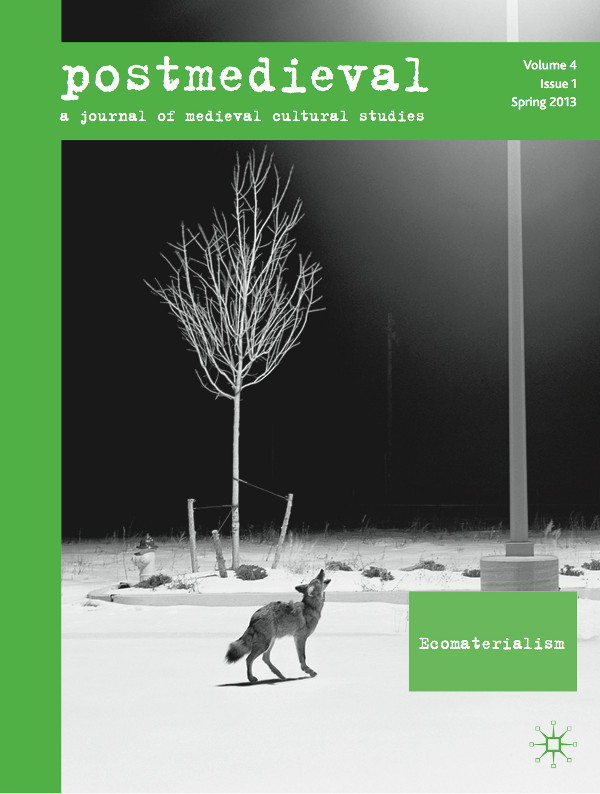Postmedieval, a Journal of Medieval Cultural Studies, Vol 4, No 1: Ecomaterialism (2013)
Filed under journal | Tags: · actor-network theory, ecocriticism, ecomaterialism, environment, landscape, materiality, medieval studies, middle ages, nature

postmedieval is a cross-disciplinary, peer-reviewed journal in medieval studies that aims to bring the medieval and modern into productive critical relation.
“The latest issue of postmedieval takes up Jane Bennett’s challenge in the last chapter of her book Vibrant Matter: A Political Ecology of Things to rethink environment and landscape from an actor-network point of view. Focusing upon the meeting of ecocriticisim with other modes of theoretical and critical inquiry, ecomaterialism creates a forum where the materiality of the world obtains the complicated agency and lack of catastrophe that environmental criticism too often does not grant. We focus upon the living elements earth, air, water, fire, and their medial instantiations: cloud, road, glacier, abyss. Rather than a traditional ecocritical mode that traces the interface of human with landscape, we are interested in reconceiving ecomaterial spaces and objects as a web of co-constituitive and hybrid actants.”
Edited by Jeffrey Cohen and Lowell Duckert
Publisher Macmillan, 2013
ISSN 2040-5960
123 pages
PDF (single PDF)
View online (PDF and HTML articles)
Jenna Burrell: Invisible Users: Youth in the Internet Cafés of Urban Ghana (2012)
Filed under book | Tags: · actor-network theory, africa, electronic waste, internet, mass media, net neutrality, networks, spam, web, youth

“The urban youth frequenting the Internet cafés of Accra, Ghana, who are decidedly not members of their country’s elite, use the Internet largely as a way to orchestrate encounters across distance and amass foreign ties–activities once limited to the wealthy, university-educated classes. The Internet, accessed on second-hand computers (castoffs from the United States and Europe), has become for these youths a means of enacting a more cosmopolitan self. In Invisible Users, Jenna Burrell offers a richly observed account of how these Internet enthusiasts have adopted, and adapted to their own priorities, a technological system that was not designed with them in mind.
Burrell describes the material space of the urban Internet café and the virtual space of push and pull between young Ghanaians and the foreigners they encounter online; the region’s famous 419 scam strategies and the rumors of “big gains” that fuel them; the influential role of churches and theories about how the supernatural operates through the network; and development rhetoric about digital technologies and the future viability of African Internet cafés in the region.
Burrell, integrating concepts from science and technology studies and African studies with empirical findings from her own field work in Ghana, captures the interpretive flexibility of technology by users in the margins but also highlights how their invisibility puts limits on their full inclusion into a global network society.”
Publisher MIT Press, 2012
ISBN 0262017369, 9780262017367
Acting With Technology series
236 pages
Harry Collins: Tacit and Explicit Knowledge (2010)
Filed under book | Tags: · actor-network theory, knowledge, language, meaning, neural networks, prosthesis, society, sociology, sociology of science, tacit knowledge

“Much of what humans know we cannot say. And much of what we do we cannot describe. For example, how do we know how to ride a bike when we can’t explain how we do it? Abilities like this were called “tacit knowledge” by physical chemist and philosopher Michael Polanyi, but here Harry Collins analyzes the term, and the behavior, in much greater detail, often departing from Polanyi’s treatment.
In Tacit and Explicit Knowledge, Collins develops a common conceptual language to bridge the concept’s disparate domains by explaining explicit knowledge and classifying tacit knowledge. Collins then teases apart the three very different meanings, which, until now, all fell under the umbrella of Polanyi’s term: relational tacit knowledge (things we could describe in principle if someone put effort into describing them), somatic tacit knowledge (things our bodies can do but we cannot describe how, like balancing on a bike), and collective tacit knowledge (knowledge we draw that is the property of society, such as the rules for language). Thus, bicycle riding consists of some somatic tacit knowledge and some collective tacit knowledge, such as the knowledge that allows us to navigate in traffic. The intermixing of the three kinds of tacit knowledge has led to confusion in the past; Collins’s book will at last unravel the complexities of the idea.
Tacit knowledge drives everything from language, science, education, and management to sport, bicycle riding, art, and our interaction with technology. In Collins’s able hands, it also functions at last as a framework for understanding human behavior in a range of disciplines.”
Publisher University of Chicago Press, 2010
ISBN 0226113809, 9780226113807
xiv+186 pages
Reviews: Alan Warde (Sociological Review, 2010), Massimo Mazzotti (Isis, 2011), Wiebe E. Bijker (Technology & Culture, 2011), Stephen P. Turner (Studies in History and Philosophy of Science, 2011), Park Doing (Social Studies of Science, 2011), Joseph Agassi (Philosophy of Social Sciences, 2013).
Commentary: Philosophia Scientiae (Léna Soler, Sjoerd D. Zwart et al., 2013).

